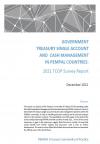October 2022
This is a knowledge product developed for the Program and Performance Budgeting Working Group (PPBWG) that operates within the Budget Community of Practice (BCOP). The Working Group decided to examine this topic because this country has the longest history and most spending reviews conducted over several decades.
This knowledge product provides a step-by-step overview of the spending review process in the Netherlands. It also takes a deeper dive into one specific case – the spending review on child support schemes.











